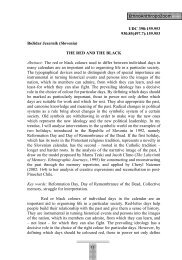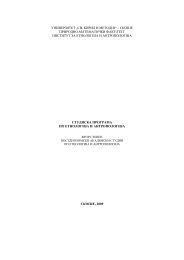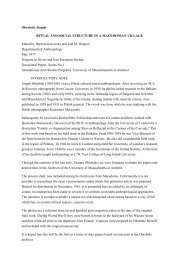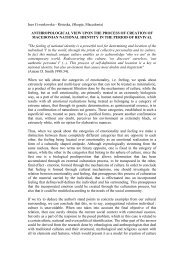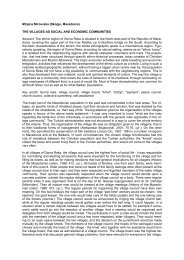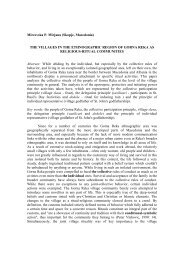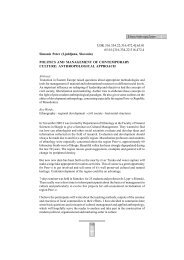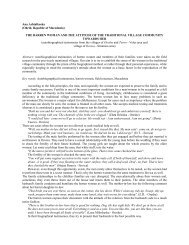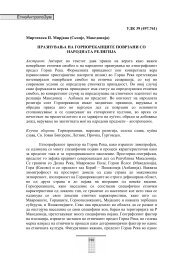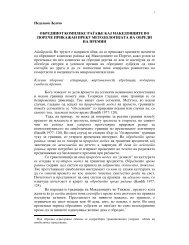Halpern M. Joel, Kerewsky-Halpern Barbara (USA)
Halpern M. Joel, Kerewsky-Halpern Barbara (USA)
Halpern M. Joel, Kerewsky-Halpern Barbara (USA)
Create successful ePaper yourself
Turn your PDF publications into a flip-book with our unique Google optimized e-Paper software.
12345<br />
12345<br />
12345<br />
12345<br />
12345<br />
12345<br />
12345<br />
12345<br />
12345<br />
12345<br />
12345678901234567890123456789012123<br />
12345678901234567890123456789012123<br />
EthnoAnthropoZoom<br />
12345678901234567890123456789012123<br />
12345678901234567890123456789012123<br />
12345678901234567890123456789012123<br />
outside the house. Inside it was immaculate, with the wooden stairs and flooring<br />
scrubbed clean and with woven rags on the floor. Piles of mats and bedding were<br />
neatly stacked in a corner, as in every Moslem home. Around three walls ran the usual<br />
low wooden bench, covered with woven red cloth and embroidered bolster pillows.<br />
The cleanliness of the home was quite a pleasant surprise after the filth we had been<br />
seeing all day. The neighboring house was that of an Orthodox family. They had just<br />
purchased land in the village and moved here from Ni{. This seemed to be an unusual<br />
circumstance. We also saw cleanliness and wondered why the good example wasn’t<br />
catching on with the more backward neighbors. (Clearly the fact that Moslems slept on<br />
bedding on the floors of their homes which were cleared away each day and the fact<br />
that ritual washing was associated with patterns of daily prayer did create a different<br />
atmosphere in Moslem homes. The question of relative hygiene is a complex one e.g.<br />
as in the care in washing food utensils. It is hard to get inside the thoughts we had fifty<br />
years ago especially since we had just arrived in Macedonia after living for a year with<br />
an Orthodox household in rural Serbia Certainly we have memories of the men washing<br />
their feet after a hard day in the fields. The tile floor in the kitchen was frequently<br />
scrubbed and the blankets aired. But there were also homes in “our“ village with dirt<br />
floors and not very hygienic conditions.)<br />
We wanted to visit a Shiptar (Albanian) house too. Finally we found a Shiptar woman<br />
whose spoke some Serbian. They all speak only their native tongue even though they<br />
may be second generation Yugoslavs by political nationality. (One can only smile at<br />
our credulity concerning the existence of a Yugoslav nationality (aside from cases of<br />
intermarriage which was very infrequent among Albanians) The extinction of the<br />
Yugoslav state was a matter that then could not be foreseen.)<br />
They too are Moslem. This meant that the house would be clean – this is due to<br />
Moslem cleansing ritual. They wash feet, hands and face before prayer five times a<br />
day. We described this way of life based on our visit to a Moslem village near<br />
Sarajevo last March. Every room has a cupboard like closet arrangement. There is a<br />
concrete platform and pipe which drains outside. Here you can pour running water<br />
over yourself and get washed. In the yard of this house a young girl was sitting on a<br />
sort of wooden platform softened by mounds of pillows. She was embroidering a<br />
kerchief and smelling rose blossoms on the bush next to her. The whole composition<br />
reminded me of the ballad of old Serbia in Turkish times, especially “Djul devojka,“<br />
(Rose Maiden).<br />
We had had enough for one day. It was obvious that our guide was dying to run away<br />
as soon as possible, so we headed back to town. In the evening we stopped in to visit<br />
our friend Du{ko, (From the ship coming over), but he was working late getting out the<br />
newspaper. But his wife and parents greeted us like old friends although we had never<br />
met. We stayed late chatting with them. We are to go see them again tonight.<br />
Yesterday being Tito’s birthday there was a big celebration in the city stadium. It ran<br />
for 3 hours, much too long, and featured guest comedians from Radio Beograd’s<br />
149<br />
12345<br />
12345



